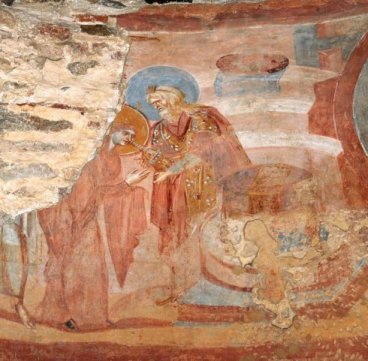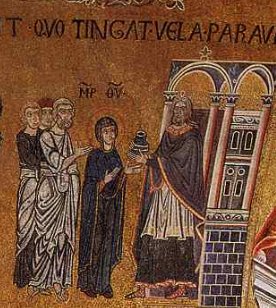|
If this story was popular
fiction, the reader would be anxious to know about Joseph's reaction when
his would-be bride returned home from her cousin clearly pregnant. Luke ignores this.
Matthew tells us a little more:
Now
the birth of Jesus Christ was on this wise: When as his mother Mary was
espoused to Joseph, before they came together, she was found with child of
the Holy Ghost. Then Joseph her husband, being a just man,
and not willing to make her a public example, was minded to put her away
privily. But while he thought on these things, behold, the angel of the
Lord appeared unto him in a dream, saying, Joseph, thou son of David, fear
not to take unto thee Mary thy wife: for that which is conceived in her is
of the Holy Ghost. And she shall bring forth a son, and thou shalt call
his name JESUS: for he shall save his people from their sins. (Ch 2 v
18-21)
No rest for that angel of the Lord.
The Gospel of Pseudo-Matthew was clearly written by a sharp storyteller
who felt that Matthew had let slip a golden narrative opportunity at this
point. This is the start of his version:
.While these things were
doing, Joseph was occupied with his work, house-building, in the districts
by the sea-shore; for he was a carpenter. And after nine months he came
back to his house, and found Mary pregnant. Wherefore, being in the utmost
distress, he trembled and cried out, saying: O Lord God, receive my
spirit; for it is better for me to die than to live any longer. And the
virgins who were with Mary said to him: Joseph, what art thou saying? We
know that no man has touched her; we can testify that she is still a
virgin, and untouched. We have watched over her; always has she continued
with us in prayer; daily do the angels of God speak with her; daily does
she receive food from the hand of the Lord. We know not how it is possible
that there can be any sin in her. But if thou wishest us to tell thee what
we suspect, nobody but the angel of the Lord has made her pregnant.
Then said Joseph: Why do you mislead me, to believe that an angel of the
Lord has made her pregnant? But it is possible that some one has pretended
to be an angel of the Lord, and has beguiled her. And thus speaking, he
wept, and said:
With what face shall I look
at the temple of the Lord, or with what face shall I see the priests of
God? What am I to do? And thus saying, he thought that he would flee, and
send her away. (Ch 10)
And when he was thinking of rising up and hiding himself, and dwelling
in secret, behold, on that very night, the angel of the Lord appeared to
him in sleep, saying: Joseph, you son of David, fear not; receive Mary as
your wife: for that which is in her womb is of the Holy Spirit. And she
shall bring forth a son, and His name shall be called Jesus, for He will
save His people from their sins. And Joseph, rising from his sleep, gave
thanks to God, and spoke to Mary and the virgins who were with her, and
told them his vision. And he was comforted about Mary, saying: I have
sinned, in that I suspected you at all. (Ch 11)
The Trial by Bitter Water
However, not everyone is convinced, and events turn into something of a
soap opera. Mary's parents turn up, and things are not looking good
for Joseph. At this point, a further legend pops up, one that almost never appears in
Western art: The trial by bitter water.
This is the version in the Protoevangelium of James:
And the priest said: Give up the virgin whom you received out of the
temple of the Lord. And Joseph burst into tears. And the priest said: I
will give you to drink of the water of the ordeal of the Lord, and He
shall make manifest your sins in your eyes. And the priest took the water,
and gave Joseph to drink and sent him away to the hill-country; and he
returned unhurt. And he gave to Mary also to drink, and sent her away to
the hill-country; and she returned unhurt. And all the people wondered
that sin did not appear in them. And the priest said: If the Lord God has
not made manifest your sins, neither do I judge you. And he sent them
away. And Joseph took Mary, and went away to his own house, rejoicing and
glorifying the God of Israel.
(Ch 16)
An ordeal to determine the truth of an accusation of adultery was
known as Sotah, which is Hebrew for 'Wayward Wife'. (Presumably it was
fine to be a wayward husband.) A nasty brew was given to the wife. If
nothing happened, she was innocent; if she became ill, she was guilty.
This is described in Numbers Chapter 5 and the apocryphal texts are based
on it. The text is here.
There is one key difference though. In the Protoevangelium Joseph drinks
the bitter water as well.
The fresco below left showing the Trial by Bitter Water comes from the
church of Santa Maria Foris Portas in Castelseprio, Lombardy. The
image on the right is more of a puzzle. It is part of the Mosaic
sequence from the Basilica of San Marco in Venice. The basilica
website describes this scene as 'The delivery of the purple cloth to Mary'
. The standard work on the subject, The Mosaic Decoration
in San Marco
Venice by Otto Demus, says that it is 'The handing over of the purple
to the Virgin, modelled on a depiction of the trial by water'. The object
in the priest's hands is certainly more like a water container than a
spindle of yarn. So is it in fact an image of the trial? Its position in
the narrative sequence and the presence of Joseph would lend some credence
to this.
|

